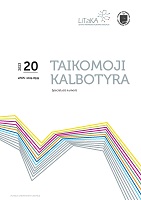Easy language for social inclusion: case study
Easy language for social inclusion: case study
Author(s): Velga Polinska, Dite LiepaSubject(s): Communication studies, Sociology, Politics and society, Translation Studies, ICT Information and Communications Technologies
Published by: Vilniaus Universiteto Leidykla
Keywords: intralingual translation; Easy language; information accessibility; Easy language translator profile; cognitive load reduction;
Summary/Abstract: The research is devised as a case study focused on the study course “Easy Language for Social Inclusion” developed within the ERASMUS+ project “Promoting Easy-to-Read Language for Social Inclusion/PERLSI”. The discussion is contextualized within a broader discourse on the training opportunities available for translators in the project countries (Latvia, Lithuania, and Slovenia). The macro-level of analysis introduces the socio-political frame of discourse on inclusion and information accessibility. The meso-level discussion evolves around the Easy language translator’s profile, based on the best practice offered by German scholars (Maaß and Rink 2020) and the immediate experience acquired during the project. Micro-level analysis offers insights into the course syllabus, the study materials developed to ensure the acquisition of knowledge, skills, and competencies necessary for reducing cognitive load at lexical, syntactic, and textual levels as well as the visual language of the text.
Journal: Taikomoji kalbotyra
- Issue Year: 2023
- Issue No: 20
- Page Range: 221-229
- Page Count: 9
- Language: English

